When solar grilling, you'll need to prioritize three key practices for clean, safe meat. First, always monitor internal temperatures with a meat thermometer – cook whole cuts to 145°F, ground meats to 160°F, and poultry to 165°F. Second, keep your raw meat in leak-proof containers and separate from other foods, using designated cutting boards and utensils to prevent cross-contamination. Third, maintain a clean workspace by establishing distinct areas for raw and cooked meat handling, and keep disinfectants nearby for immediate cleanup. These fundamental steps lay the groundwork for mastering safe solar grilling techniques.
Safe Meat Temperature Standards
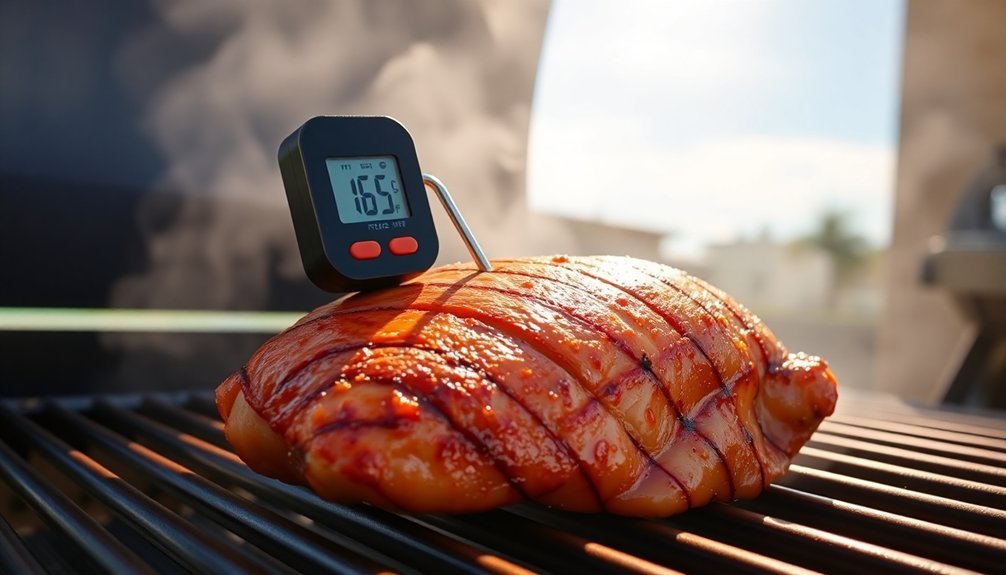
Food safety begins with proper cooking temperatures. When solar grilling, you'll need a food thermometer to guarantee your meats reach the right internal temperatures.
Cook whole cuts of beef, lamb, pork, veal, mutton, and fish to 145°F, followed by a three-minute rest period.
For ground meats like beef, lamb, venison, pork, bison, and rabbit, you'll want to reach 160°F.
Poultry requires special attention – whether it's whole, pieces, or ground, cook chicken and turkey to 165°F to eliminate harmful bacteria like Salmonella and Campylobacter.
Bacteria multiply rapidly in the temperature danger zone between 40°F and 140°F, so monitor your cooking temperatures carefully.
After cooking, keep your food hot at 140°F or above.
If you're saving leftovers, refrigerate them within two hours (one hour in hot weather above 90°F), and store them in small, covered containers.
Handling Raw Meat Guidelines
When preparing for solar grilling, proper raw meat handling becomes your first line of defense against foodborne illness. You'll need to maintain strict separation between raw meat and other foods while keeping your prep area sanitized. Always wash your hands thoroughly before and after handling raw meat, and use paper towels instead of cloth for cleanup. Bacteria thrive rapidly if raw meat sits out too long, so immediate refrigeration is essential.
| Do This | Don't Do This |
|---|---|
| Use separate cutting boards | Mix raw meat with produce |
| Store meat in leak-proof containers | Leave meat at room temperature |
| Clean surfaces with hot soapy water | Reuse unwashed utensils |
| Marinate in refrigerator | Cross-contaminate handles |
| Transport in cooled containers | Use cloth towels for cleanup |
Remember to defrost meat in the refrigerator or microwave, and cook it immediately after thawing. Keep raw meat juices contained and dispose of any marinades unless you boil them first.
Clean Workspace Essentials

Building on proper meat handling practices, a clean workspace sets the foundation for safe and successful solar grilling.
You'll need to establish a systematic cleaning routine before, during, and after your grilling session. Start by designating specific areas for raw meat preparation and cooked food handling. Consider implementing a daily cleaning checklist to ensure consistent hygiene standards.
Keep your workspace organized by using separate containers for different ingredients and tools. Store your grilling supplies in dedicated spaces and maintain a clutter-free area.
You'll want to have quality cleaning supplies within reach, including disinfectants, microfiber cloths, and hand sanitizers. Remember to regularly clean high-touch surfaces like cutting boards, utensils, and preparation areas.
Don't forget to wash your hands frequently and guarantee proper ventilation in your cooking space to maintain hygiene standards.
Frequently Asked Questions
How Long Can Marinated Meat Stay in Direct Sunlight Before Grilling?
You shouldn't leave marinated meat in direct sunlight at all. It's unsafe due to rapid bacterial growth. Always keep your marinated meat refrigerated until you're ready to start grilling to prevent foodborne illness.
Can I Use Aluminum Foil to Prevent Meat From Sticking?
Yes, you can use aluminum foil to prevent meat from sticking to your grill. It's an effective method that'll protect your food while making cleanup easier. Just place the foil directly on the grates before cooking.
Should I Oil the Grill Surface Differently for Solar Grilling?
No, you don't need to oil your solar grill differently. Use the same high-temp oil application methods as traditional grills – just wipe on a thin layer before cooking to prevent sticking.
Does Meat Cook Faster on Reflective Versus Dark Solar Grill Surfaces?
You'll cook meat faster on reflective surfaces since they concentrate more solar energy onto your food. While dark surfaces absorb heat well, reflective materials can double the radiation hitting your cooking area, reducing cooking time.
How Do I Maintain Consistent Temperature When Clouds Pass Overhead?
When clouds pass overhead, you'll need to adjust your heat zones, monitor temperature closely with a thermometer, and manage airflow through vents. Add more fuel or adjust burner controls as needed to maintain consistency.
In Summary
You'll keep your solar grilling safe and enjoyable by following these three vital tips. Remember to check meat temperatures with a reliable thermometer, handle raw meat with separate utensils and clean hands, and maintain a spotless workspace. Don't skip these important food safety steps – they're your best defense against foodborne illness and will guarantee your solar-cooked meals are both delicious and safe.
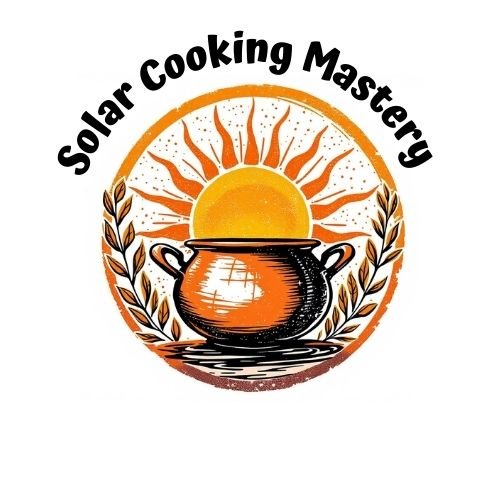
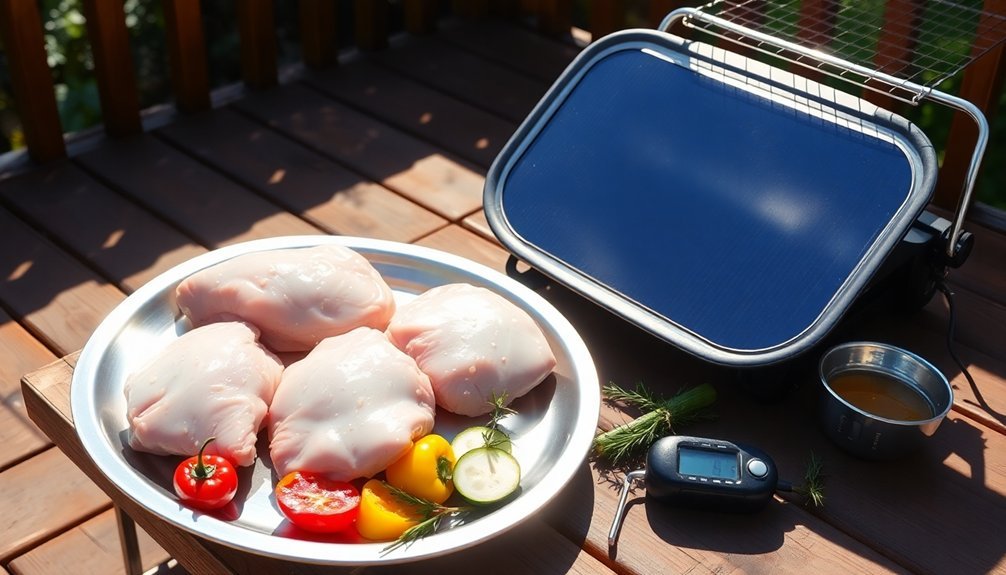
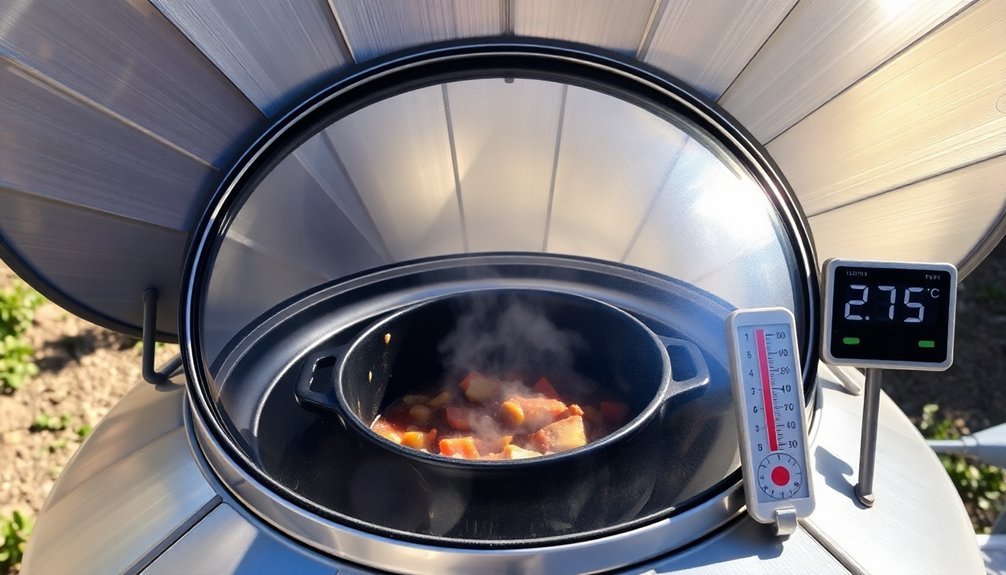
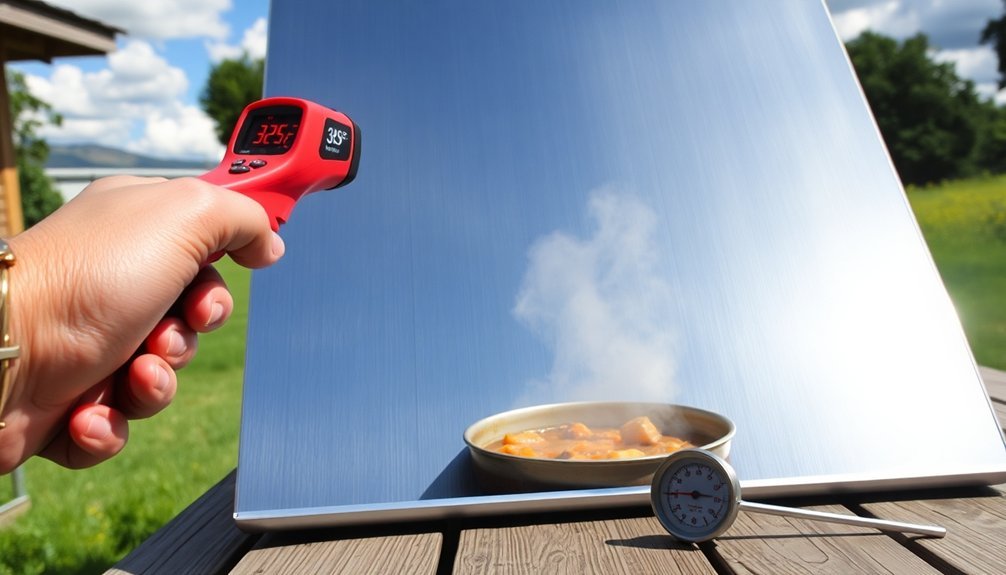
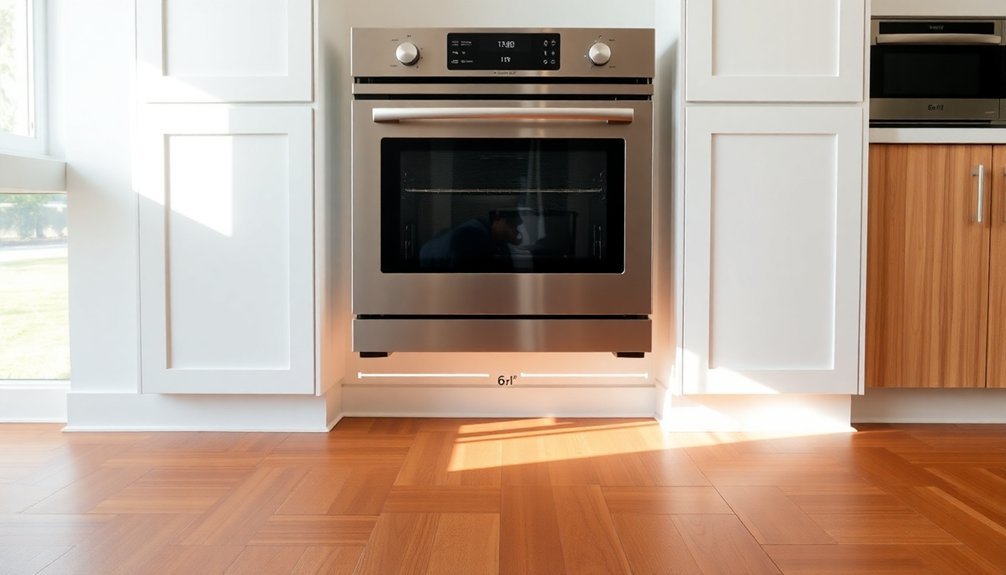
Leave a Reply